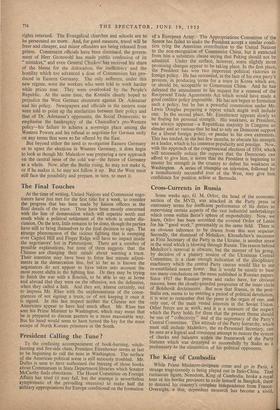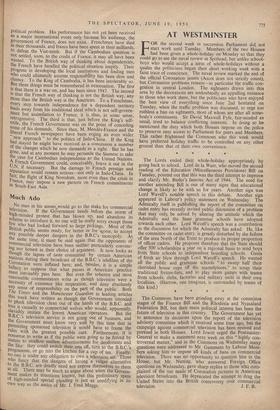The King of Cambodia
While Prime Ministers-designate come and go in Paris, a strange tragi-comedy is being played out in Indo-China. That ruritanian figure, Norodom, King of Cambodia, broke a royal tour of his border provinces to exile himself in Bangkok, there to demand his country's complete independence from France. Overnight, a dim, dependent monarch has become a vivid, political problem. His performance has not yet been received as a major international event only because his audience, the government of France, does not exist. Frenchmen have died in their thousands, and francs have been spent in their milliards, to defeat the Viet-minh. But if the Cambodian question is not settled, soon, to the credit of France, it may all have been wasted. To the British way of thinking about dependencies, the French have handled the political situation ineptly. Their Progress in developing the local institutions and finding men who could ultimately assume responsibility has been slow and clumsy. To the King of Cambodia, it has been intolerably so. But three things must be remembered in extenuation. The first is that there is a war on, and has been since 1947. The second is that the French way of thinking is not the British way, any more than the British way is the American. To a Frenchman, every step towards independence for a dependent territory leads away from his traditional ideal which is not self-govern- ment but assimilation to France; it is thus, in some sense, retrogressive. The third is that, just before the King's self- exile, the French Government was on the point of conceding some of his demands. Since then, M. Mendes-France and the liberal French newspapers have been urging an even wider ,. new approach " to the politics of Indo-China. If the King had stayed he might have received as a concession a number of the changes which he now demands as a right. But he has gone, and at any moment he may persuade the Siamese to take the case for Cambodian independence to the United Nations. A French Government could, conceivably, brave it out in the U.N. if necessary. But the damage to French prestige and reputation would remain serious—not only in Indo-China. In fact, the flight of King Norodom, more even than the crisis in France, may impose a new pattern on French commitments in South-East Asia.



















































 Previous page
Previous page